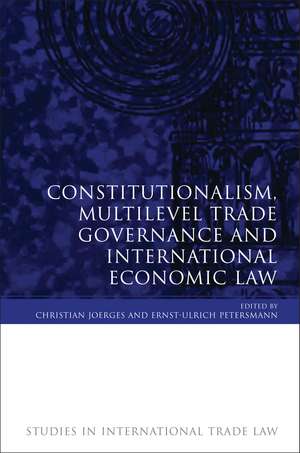Constitutionalism, Multilevel Trade Governance and International Economic Law: Studies in International Trade and Investment Law
Editat de Christian Joerges, Ernst-Ulrich Petersmannen Limba Engleză Paperback – 23 iun 2011
Din seria Studies in International Trade and Investment Law
- 13%
 Preț: 195.38 lei
Preț: 195.38 lei - 30%
 Preț: 901.55 lei
Preț: 901.55 lei - 37%
 Preț: 510.83 lei
Preț: 510.83 lei - 30%
 Preț: 512.69 lei
Preț: 512.69 lei - 19%
 Preț: 303.80 lei
Preț: 303.80 lei - 22%
 Preț: 231.24 lei
Preț: 231.24 lei - 30%
 Preț: 601.63 lei
Preț: 601.63 lei - 30%
 Preț: 781.55 lei
Preț: 781.55 lei - 13%
 Preț: 238.76 lei
Preț: 238.76 lei - 30%
 Preț: 570.11 lei
Preț: 570.11 lei - 30%
 Preț: 1016.59 lei
Preț: 1016.59 lei - 30%
 Preț: 600.15 lei
Preț: 600.15 lei - 30%
 Preț: 778.68 lei
Preț: 778.68 lei - 30%
 Preț: 955.20 lei
Preț: 955.20 lei - 30%
 Preț: 540.80 lei
Preț: 540.80 lei - 30%
 Preț: 956.09 lei
Preț: 956.09 lei - 30%
 Preț: 543.08 lei
Preț: 543.08 lei - 30%
 Preț: 599.66 lei
Preț: 599.66 lei - 26%
 Preț: 777.71 lei
Preț: 777.71 lei - 22%
 Preț: 269.66 lei
Preț: 269.66 lei - 22%
 Preț: 266.30 lei
Preț: 266.30 lei - 18%
 Preț: 299.86 lei
Preț: 299.86 lei - 18%
 Preț: 307.97 lei
Preț: 307.97 lei - 18%
 Preț: 306.26 lei
Preț: 306.26 lei - 18%
 Preț: 305.53 lei
Preț: 305.53 lei - 27%
 Preț: 447.39 lei
Preț: 447.39 lei - 18%
 Preț: 321.48 lei
Preț: 321.48 lei - 30%
 Preț: 512.54 lei
Preț: 512.54 lei - 30%
 Preț: 573.70 lei
Preț: 573.70 lei - 30%
 Preț: 511.40 lei
Preț: 511.40 lei -
 Preț: 374.56 lei
Preț: 374.56 lei
Preț: 444.01 lei
Preț vechi: 607.71 lei
-27% Nou
Puncte Express: 666
Preț estimativ în valută:
84.97€ • 88.38$ • 70.15£
84.97€ • 88.38$ • 70.15£
Carte disponibilă
Livrare economică 24 martie-07 aprilie
Preluare comenzi: 021 569.72.76
Specificații
ISBN-13: 9781849461658
ISBN-10: 1849461651
Pagini: 616
Dimensiuni: 156 x 234 x 27 mm
Greutate: 0.86 kg
Ediția:Revised
Editura: Bloomsbury Publishing
Colecția Hart Publishing
Seria Studies in International Trade and Investment Law
Locul publicării:London, United Kingdom
ISBN-10: 1849461651
Pagini: 616
Dimensiuni: 156 x 234 x 27 mm
Greutate: 0.86 kg
Ediția:Revised
Editura: Bloomsbury Publishing
Colecția Hart Publishing
Seria Studies in International Trade and Investment Law
Locul publicării:London, United Kingdom
Notă biografică
Christian Joerges was until 2007 Professor of Economic Law at the European University Institute, Florence and is now Research Professor at the University of Bremen and Co-Director of the Centre for European Law and Politics.Ernst-Ulrich Petersmann is Professor of International and European Law at the European University Institute at Florence.
Cuprins
Section I: International Trade Law: Constitutionalisation and Judicialisation in the WTO and Beyond Section I.1 Constitutionalisation and the WTO: Two Competing Visions from Two Different Disciplines 1. Multilevel Trade Governance in the WTO Requires Multilevel Constitutionalism Ernst-Ulrich Petersmann2. Democratic Legitimacy of Transnational Trade Governance: A View from Political Theory Patrizia NanzSection I.2 Judicialisation: Empirical Inquiries and Constitutional Concerns 3. Dispute Settlement under GATT and WTO: An Empirical Enquiry into a Regime Change Achim Helmedach and Bernhard Zangl4. The Appellate Body's 'Response' to the Tensions and Interdependencies Between Transnational TradeGovernance and Social Regulation Christiane GerstetterSection I.3 Participatory Governance: Emerging Patterns and their Juridification 5. Why Co-operate? Civil Society Participation at the WTO Jens Steffek and Claudia Kissling6. Legal Patterns of Global Governance: Participatory Transnational Governance Rainer NickelSection I.4 Legalisation Patterns outside the WTO 7. Non-Traditional Patterns of Global Regulation: Is the WTO 'Missing the Boat'? Joost Pauwelyn8. Conflicts and Comity in Transnational Governance: Private International Law as Mechanism andMetaphor for Transnational Social Regulation through Plural Legal Regimes Robert WaiSection II: Transnational Governance Arrangements for Product Safety Section II.1 Food Safety Regulation: the SPS Agreement and the Codex Alimentarius 9. Fixing the Codex? Global Food-Safety Governance Under Review Thorsten Hüller and Leo Maier10. The Precautionary Principle in Support of Practical Reason: an Argument Against Formalistic Interpretations of the Precautionary Principle Alexia Herwig11. Beyond the Science/Democracy Dichotomy: The World Trade Organisation Sanitary and PhytosanitaryAgreement and Administrative Constitutionalism Elizabeth Fisher12. Administrative Globalisation and Curbing the Excesses of the State Damian ChalmersSection II.2 The TBT Agreement and International Standardisation 13. A New Device for Creating International Legal Normativity: The WTO Technical Barriers to Trade Agreement and 'International Standards' Robert Howse14. The Empire's Drains: Sources of Legal Recognition of Private Standardisation under the TBT Agreement Harm SchepelSection III: Alternative Conceptions of International Economic Law and Multilevel Governance 15. The Idea of a Three-dimensional Conflicts Law as Constitutional Form Christian Joerges16. The World Trade Organization and Global Administrative Law Richard B Stewart and Michelle Ratton Sanchez-Badin17. Towards a Five Storey House Thomas Cottier18. The Future of International Economic Law: A Research Agenda Ernst-Ulrich Petersmann
Recenzii
It brings together an impressive collection of international scholarship exploring international economic law in light of constitutional theory with many well-established experts in the field alongside some relatively junior and highly promising scholars.
Descriere
This book considers the ever complex legal networks of transnational economic governance and their legitimacy problems.
